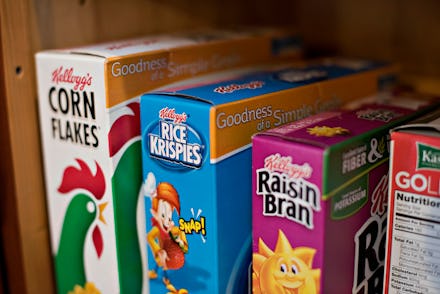The Very Best Holidays Aren't Real Holidays At All

Get your stomach ready to celebrate. March is National Frozen Food Month ... and National Flour Month, National Peanut Month and even National Caffeine Awareness Month. This week we have National Cereal Day, and the end of March brings National Black Forest Cake Day. There's a food holiday or two or three for every day of the month — as if St. Patrick's Day wasn't bad enough (which coincidentally falls on Corned Beef and Cabbage Day).
And March isn't the only month like it. Though it's hard to get an exact count on these less-than-real "holidays," there are far more than there are days in the year. Unsurprisingly, these aren't real holidays. But there are very real reasons we love them.
Where they come from: Though Ronald Reagan created holidays like National Catfish Day and the aforementioned National Frozen Food Day through presidential proclamations, most of the food days' origins are a bit more dubious. The book Chase's Calendar of Events, a 750-page tome of annual events from celebrity birthdays to historic holidays, bears some responsibility for the spread of fishy food holidays. As its website states, "The majority come from national organizations that use their observances for public outreach and to plan specific events."
In fact, to become an "official" Chase-sanctioned holiday, all you need is a sponsoring organization and "enthusiasm" for the food, the book's editor, Holly McGuire, told New York Times in 2007.
Just a PR stunt? It's no coincidence that, as the New York Times wrote, public relations executives tend to have copies of Chase's Calendar of Events in their offices. Despite most of us sensing that National Dairy Month (sponsored by the National Dairy Council) isn't exactly legit, these holidays are still "celebrated" online, largely by media outlets.
The Huffington Post has an entire subsection devoted to food holiday articles, and publications like Bon Appétit and Epicurious have also occasionally fallen under the food day spell. Food day articles are often the result of a press release about the great history of corned beef, grapefruit or even surf 'n turf.
Some magazines and sites refuse to engage in the hype, resistant to the pressures of brands or industry councils. "It's a policy at Eater to ignore these holidays," Eater engagement editor Greg Morabito told Mic. "There's a reason why you eat Thanksgiving dinner and there's some historical tie. Food days are made up by food and agricultural boards."
Even Bon Appétit has admitted that a "successful food day is all about good PR." As their contributor Michael Y. Park wrote in 2014, "Whenever you're celebrating a food holiday, you're really celebrating a great marketer."
Morabito, for one, believes the food world would be a better off ignoring the faux festivals. "There is a way to celebrate specific foods without having to link it to some holiday that has no context or meaning to the world at large," he says.
Holidays for the people: But while editors and writers may resist being told what to write about when, much of the Internet has no problem with the holidays. In fact, the obsessive nature of each laser-focused holiday is perfectly suited to our social media age.
The popular blog Foodimentary, created by John-Bryan Hopkins, features one food holiday almost every day of the year. Hopkins writes a few interesting facts about each food as well as a brief "today in food history" segment. He doesn't need a National Doughnut Day to talk about doughnuts, of course, but the food holidays provide some structure for tackling an otherwise limitless subject.
And then there's us, the world's eaters — likely the real reason the holidays even exist. You can find food days being celebrated all across Twitter, from food bloggers to enthusiastic eaters who just want to give Pancake Day a shoutout. There are silly GIFs, Instagram odes and even roundups of food day-themed items on Etsy.
Just as social media has the power to drive actual food trends (avocado toast, anyone?) and food-themed crazes (see: #Snackwave), it's also the ideal platform to indulge food obsessions in the form of holiday celebrations.
Public relations strategies aside, there's a reason why these food days keep getting passed around the Internet. Even if the holidays themselves are fake, they are the perfect lighthearted outlet in our era of Internet obsessions, food Instagrams and exuberant snacking. We love celebrating our affinities publicly — these "holidays" are the ideal opportunity to broadcast our food loves. And hey, there's nothing wrong with that.
So go ahead and rejoice over White Chocolate Cheesecake, Artichoke or Crabmeat Day. Just hopefully not all at once.